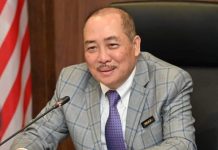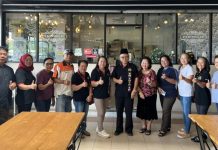KOTA KINABALU: China remains a vital business partner for Sabah, with the state’s exports to China amounting to RM7.6 billion or 19.5 per cent of its total exports in 2023, said Chief Minister Datuk Seri Panglima Haji Hajiji Haji Noor.
He said Sabah’s key exports to China included palm oil, timber, seafood, and rubber, while imports included machinery, electronics, and various manufactured goods.
“Chinese investments in sectors like agriculture, aquaculture, and infrastructure continue to grow. We see vast potential in green technology and high-tech agriculture, smart cities, manufacturing, renewable energy, e-commerce and education,” he said at the opening of the Malaysia (Sabah) – Business Summit at the Sabah International Convention Centre here tonight.
Hajiji’s speech was delivered by Deputy Chief Minister II/Local Government and Housing
Minister Datuk Seri Panglima Dr Joachim Gunsalam.
“We are pleased that Sabah has remained a sought-after destination for China visitors,
both for leisure and for business. Moving forward, we are also keen for Chinese investors
to explore new opportunities such as in Sabah’s Blue Economy,” he said.
He reiterated that Blue Economy offers immense investment opportunities in fisheries
and aquaculture, logistics, tourism, renewable energy, mineral resources, biotechnology
and pharmaceuticals, blue carbon, waste management and pollution control, research
and development, and marine infrastructure, amongst others.
“Similarly, the energy sector presents significant opportunities and while oil and gas
remain important revenue streams for Sabah, we welcome investors to also explore
solar and storage technologies, hydro, geothermal, and carbon market opportunities,”
he said.
The Chief Minister said tourism has remained a critical driver of Sabah’s economy and
has served as a vibrant link, particularly with China.
“Sabah has recorded 2.42 million domestic and international arrivals from January to
September this year. Of this, 991,629 are international arrivals. China topped the list of
visitor arrivals at 383,827.
“This makes China the largest source of foreign visitors to Sabah. We will continue to
enhance tourism infrastructure, focusing on high-value and sustainable tourism that
highlights Sabah’s natural and cultural richness,” he said.
Hajiji said Sabah envisioned a modernised agriculture sector with technology-enhanced
productivity and high-value processing facilities.
He added that investment in smart farming, precision agriculture, and sustainable
practices can strengthen Sabah’s food security, diversifying agricultural outputs and
enhancing food supply resilience.
He said Chinese investments in KKIP have created jobs and spurred economic growth,
particularly in solar glass, food, and rubber manufacturing.
“We welcome advanced technologies like drones to optimise logistics and manufacturing while exploring other sectors to drive sustainable economic development,” he said.
Hajiji said education serves as a foundation for mutual understanding.
“Sabah encourages partnerships for twinning programmes and cultural exchanges to
elevate our workforce and foster deeper connections. We aim to promote joint
educational programmes and cultural exchanges that will build bridges of trust and
understanding between the people of Sabah and China,” he said.
Hajiji said the Summit underscored the State Government’s commitment to
strengthening Sabah-China relations.
“I hope this Summit will bring fruitful discussions and explore positive collaborations
across all sectors. I urge all participants to this Summit to work in unison to realise the
objectives we have set out to achieve for our mutual benefit,” he said.-pr/BNN






